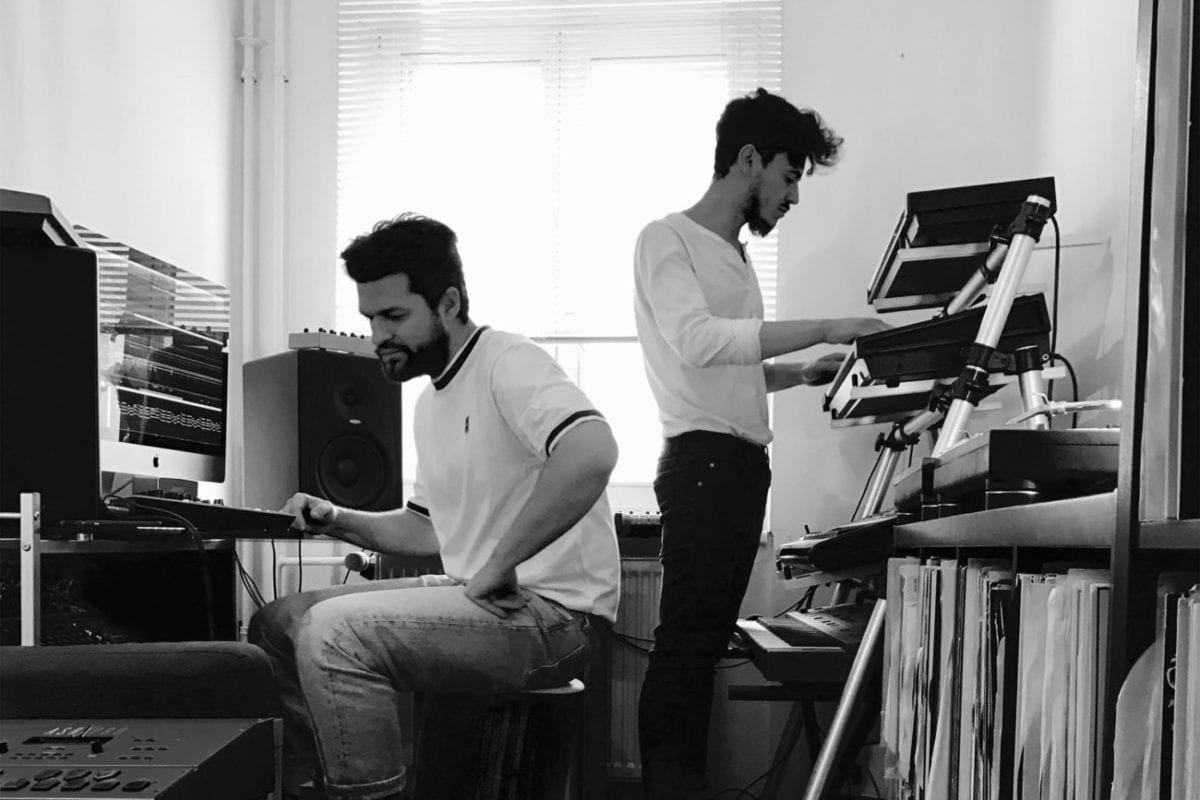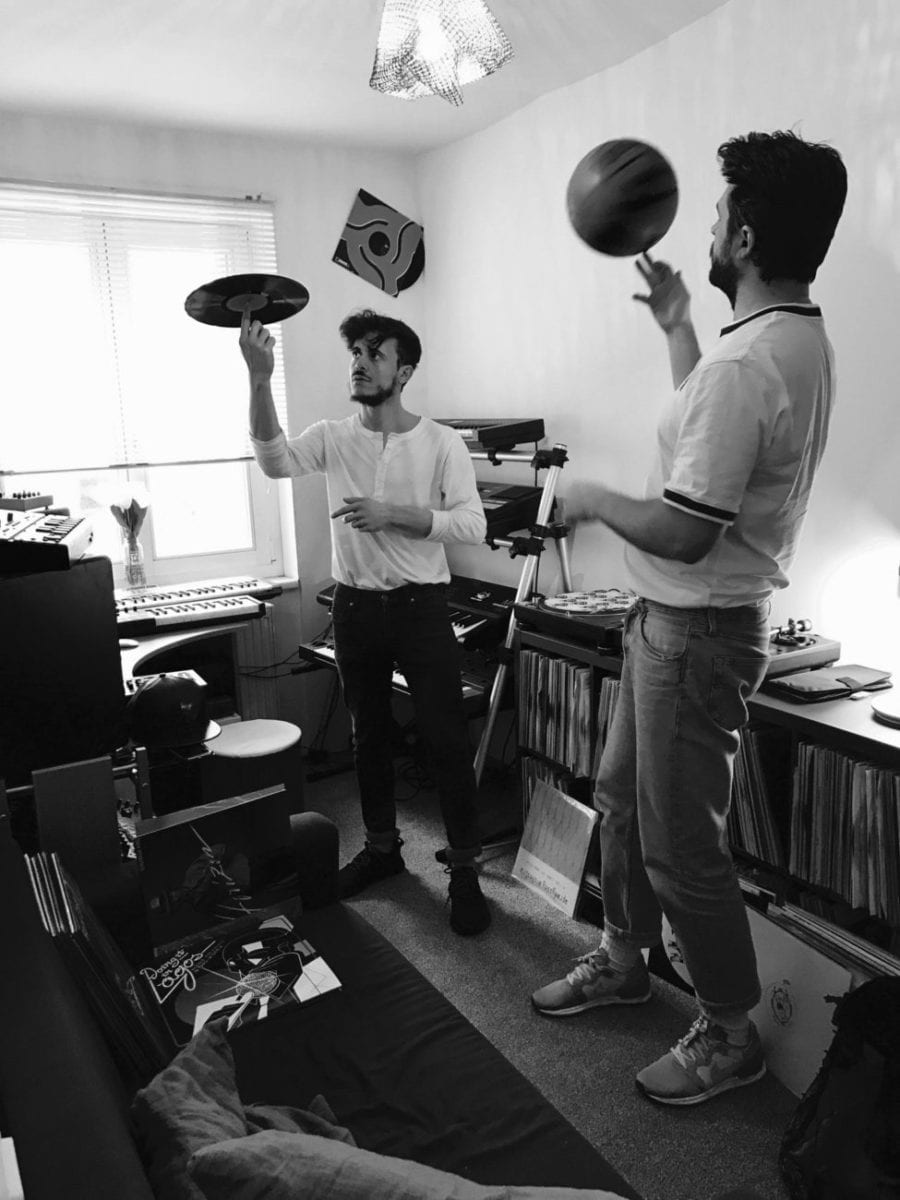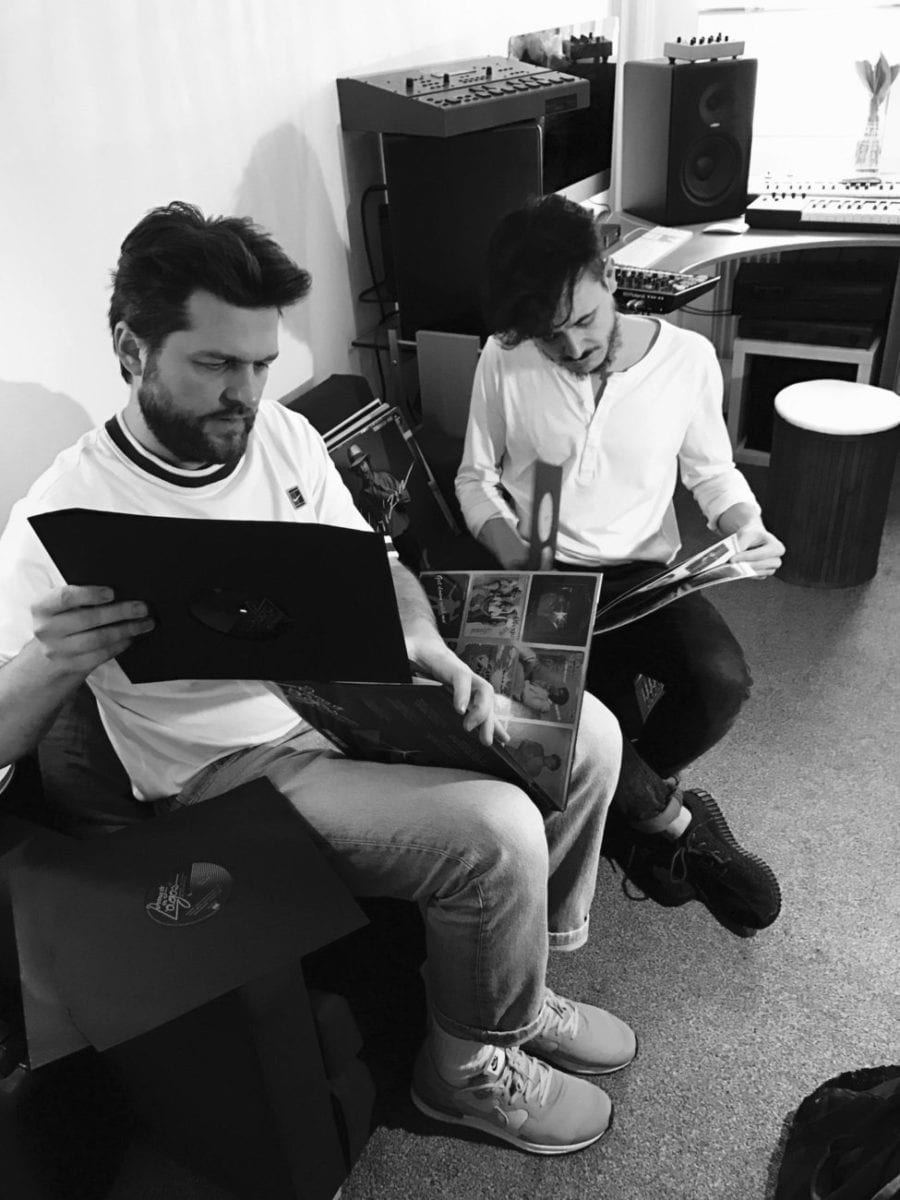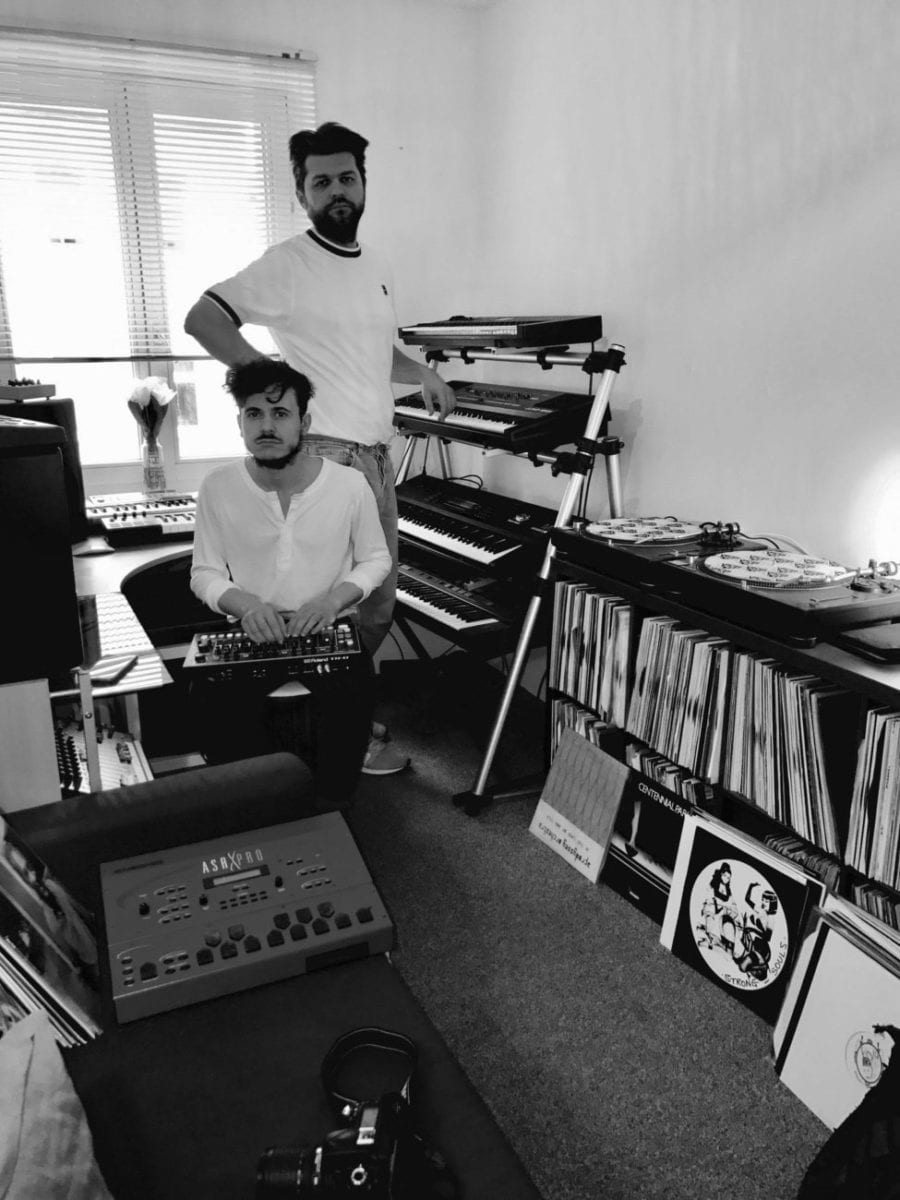
It’s fair to say the enigmatic Italian duo Stump Valley have been on our radar for a quite a while. Even though very little information is to be found about them on the world wide web, here’s a few basic things to know about Alex and Francesco: having released a bunch of 12”s on acclaimed imprints such as Rush Hour’s ‘No Label’, Off Minor, and Lakuti’s Uzuri imprint, sharing a groove-obsessive aesthetic that falls right in line with the output of producers like Theo Parrish, Larry Heard or Louie Vega.
When it comes to the DJ booth, Stump Valley certainly know how to deliver, showing impressive skills behind the decks and in the studio altogether whilst besides the music itself, the pair have been able to spark much of an interest owing to the mystery that orbits their works and lack of usual biographical elements we’re used to see from artists. In the current era of untamed information flows and constant ubiquity of social networking, this has become rare enough to be highlighted.
Ahead of their next release on Amsterdam based imprint Dopeness Galore, and with only a small manifesto from their Soundcloud description to feed from, we caught up in Berlin with Alex and Francesco to better understand the duo’s singular trajectory as they discuss the project’s steady evolution and wide-ranging influences, the gradual disappearance of record stores and the question of secrecy in music.
Interview by Ben Bar-Or Photography by Alessia Costanza Senatore

"The production side, even if it was something I really wanted to develop came along when I met Alexei. At that time we didn't know what we were doing, we were just doing it because we felt the need to do it."
How did you two get to know each other?
Alex: I was working in a pizza place in Turin, he came in there with a record bag, which immediately caught my attention. We started to talk and I found that he was listening to the same underground stuff I was listening to at that time. There weren’t that much ‘underground’ people in town, so we were curious and pretty much straight away said ‘ok let’s meet and play some music together’. We started to go to his place in the weekends to play music and since then we always played together.
When did you start engaging with music?
Alex: I started to collect records when I was 13 or 14 years old.
Francesco: Music was always part of my life, because in my family we were always surrounded with music and that was always stimulating. The certain thing is that music was fundamental for me since my childhood.
So records came before playing instruments or producing?
Alex: Yeah, first I was a DJ, definitely. I was DJing for more then ten years before I started to produce in 2003.
Francesco: I definitely started with the decks. The production side, even if it was something I really wanted to develop came along when I met Alexei. At that time we didn’t know what we were doing, we were just doing it because we felt the need to do it.
How or who exposed you to vinyl culture and digging, can you recall how was it back then?
Francesco: I approached records through two different passages. I inherited a great collection of afro records from a relative when I was 11, the second passage was a record shop specialised for DJs. This is where I met Baldo and for me and Alexei that was a very important listening point, Baldo was working at this shop called Mondo Musica. He introduced me to house, records from Maurizio, Rhythm and Sound, music that completely changed my life.
Another important aspect of my formation was a radio station called Radio Italia Network, FM station that was playing a lot of house and club music. I remember back then recording cassettes from programs like Mastermix, Suburbia, Masternight etc.
Alex: I was just going to places you know, at the time there were many record shops in Turin, which are now all pretty much closed. I’m so sad about that, there’s maybe one that’s still open but most of them are gone because people don’t buy their records anymore. They were pretty small but the selection was very good, a lot of underground stuff, so I mean, there was a lot of nice music around to discover.
I also remember Louis Tolo and his collection, with no genre or artist classifying you had to listen to 500 records to find something, but you could always find great records. Then Baldo, this guy from Turin, introduced me to Chain Reaction and all that stuff from Basic Channel. And I mean, by the way, I started with house stuff, Masters at Work [showing his Louis Vega and Kenny Dope tattoo on his chest], I fell in love with them, that was my first love. At that time I played mostly techno and house, but then I went much more into house.

"We decided to go to this place in a small town close to Turin. It’s called Valle Ceppi, which is the literal translation for Stump Valley."
I am not surprised, listening to the Stump Valley EPs, they’re rich in organic elements that house music is sometimes associated with.
Alex: Because you know, as we get older, I try to listen more to real instruments and slower stuff in the home listening context. When I was younger I was much more into techno, all these shelves are filled with old techno records I was buying [pointing the lower shelves of his collection] and those are house, disco and listening stuff [Upper and more accessible shelves].
Going back to your meeting, how did it develop to being Stump Valley?
We started working together, we had this project with an Italian label, and it went pretty well. We released like 10 records with these guys and we started to obtain bigger connections with them. At one point we started to help with the label management. We also got this residency at this after-party club, Doctor Sax, which DJs from abroad really enjoy playing there because the atmosphere was very liberating and it was a platform to basically play anything you want.
But I guess that at some point for you two all this wasn’t challenging enough?
Things weren’t bad at all, but we were not satisfied, we weren’t really going anywhere. It felt like running around in this circle… We had to take a decision, we even thought that maybe we shouldn’t do music anymore. We were quite depressed. At the end we decided to go to this place in a small town close to Turin. It’s called Valle Ceppi, which is the literal translation for Stump Valley.
Francesco’s uncle [DJ Pepe] let us stay at his place, it was the last house in town just before the woods start, so it felt like it was just us and the woods there. We didn’t even know that this would bring us to have Stump Valley or whatever, we just stayed at his place and we made music without distractions.
After two years we had 15 tracks, we chose 12 of them and waited a bit to see what happens…you know? We were already thinking that if this doesn’t work, we’ll keep it as a hobby and each one will do his thing.
So that was sort of your last try?
Yeah, at a certain point you look at yourself in the mirror and you might think “I’m not that good you know? Maybe I don’t deserve to become this guy who can play music in front of people and make a living out of it.” It’s not that we want to be like David Guetta, we don’t care, we just want to play our music, to play the stuff we like… So we said let’s try this and lets see what happens.
And things happened very fast..?
We made a Facebook profile and uploaded the tracks to Soundcloud. We didn’t upload any pictures with our faces on it. In the same day we started to send friendship requests. In like 12 hours we started hearing back from people and among them Jordan (Czamanski, one half of Juju & Jordash) answered and said he’d like to release our music.
That was crazy because we never had people from abroad saying they wanted to release our music and even more because he himself told us he didn’t know why he listened to the tracks from the beginning. The guy receives a huge amount of music on a daily basis and somehow he still listened to our tracks.
We also got an answer from Mark E and the next morning from Lerato so in 72 hours we already had three releases queued up. Given the fact we started 10 years before and nobody even answered us we really felt something is happening.

"It’s not like we wanted to make it a Burial thing, you know, it was about putting the music in the front without putting our own experience or story into this. It wasn’t the right time to provide these long bios as we were at the beginning of the project."
What made the appeal that got these people to listen to your music in your opinion?
The main reason why we claimed this attention to this project was the fact that we had something fresh, and the fact we were sending music without concrete pictures. It wasn’t the usual type of thing when you see DJs with headphones scratching records… it was just a forest and like…who is it?
You could say maybe this guy does music for a long time already, maybe not, you don’t know. We just wanted to focus on the music and see how the music works and not the image or the fact that we’ve done some records before. I believe this is the reason why we gained this attention in the beginning but then, I mean, music talks. So if we wouldn’t have the right music the people would not answer back.
So the ‘no faces’ policy was quite intentional?
Yeah but it’s not like we wanted to make it a Burial thing, you know, it was about putting the music in the front without putting our own experience or story into this. It wasn’t the right time to provide these long bios as we were at the beginning of the project. I mean we weren’t in that mindset we don’t want to say who are we, but it wasn’t the right time, we were concentrated on other things.
But recently things have changed a bit….?
We honestly started to show our faces because people started taking pictures of us. So we said ‘fuck it’, let’s stop this story of the back photos and just put our ugly faces.
It makes me think, how much do you guys care about reviews and coverage? Do you go online and see what people think and so on?
Alex: We’re curious of course. Francesco is better with this stuff, he’s more native with this. I’m not into the social thing as much. I mostly prefer to stay here and listen to music, but of course I’m doing it because I have someone else doing it for me. I’m too lazy for this.
That’s the advantage of being a duo right?
Yeah sure, even though being a duo sometimes feels more like an obstacle. It’s not a big advantage when you try to get gigs because booking two persons is more expansive.
Do you think it effects the bookers?
Until a certain while for sure. If you didn’t release that much stuff, if you’re not that hyped… people will prefer to have less expense and that’s normal. Sometimes we do this kind of ‘solo’ show because one of us is in Italy and somebody for example from the south of Italy calls us up and says something like “we have this for you at this budget”.

"We want to give new life to some of the old-school stuff we are into. We give it our own interpretation. We play a lot of old school stuff but we also integrate stuff that has this more modern aesthetics."
There’s no problem for you guys to divide some gigs between you two? I think I would be afraid of missing out…
Alex: It’s a matter of trust you know… when we DJ, I totally trust him and it’s the same for him. Stump Valley is growing and we enjoy and care for it so… If I go to play in Berlin or wherever, he knows that I’ll play the music he likes and it’s the same for me.
Carrying on the Stump Valley aesthetic?
Yeah, we want to keep that aesthetic when we play.
On that note, how would you describe Stump Valley’s aesthetic when it comes to the DJ booth?
Oh… that’s a hard one… it’s like asking what kind of genres you like…?
If you had to point out something?
Alex: I would say like ah… we want to give new life to some of the old-school stuff we are into. We give it our own interpretation. We play a lot of old school stuff but we also integrate stuff that has this more modern aesthetics.
It’s also about presenting these tracks in new ways?
We try to balance it and put our taste in this kind of context… but I mean, for example, Larry Heard’s music is timeless. Today you listen to the tracks Larry Heard produced in the late ‘80s, even the not so famous ones, and you think that it could have been produced today. It’s fresh and it still feels relevant, and of course we are not Larry Heard but this is what we are trying to do actually; Music that in 10-20 years from now would still work.
So you don’t pay much attention to trends or what other people do at certain moments?
You know, when we try do something which is like the music of the moment, we do it and then we don’t like the outcome. We want to get our own thing regardless of the current trends.
Do you have some records that always stay in your bag?
Alex: I can go through some of them yeah, there are many actually… I got this one [Strong Souls – Sensual Let’s Work] 7 years ago and it’s the most I’ve spent on a record. I’d play it in almost any club, it really works, and it’s Larry Heard actually. It was re-issued a few months ago. It’s Nothing you would say about ‘oh fuck, what is it?’ but anytime you’d play this track people react and enjoy it.
Francesco: I don’t have any specific record I always bring with me, but surely you’ll find some [records from] Roy Ayers, Theo Parrish, Larry Heard and Pino Daniele.

"Music is for everyone and everyone should be able to afford and play the music they want to play. Of course you need to support and pay for the music you play but not that much, especially in the underground realm you know?"
What is your take about represses and exclusivity of records?
Represses are definitely good, people should be able to afford these records. We don’t like the fact that people charge that much for music. Music is for everyone and everyone should be able to afford and play the music they want to play. Of course you need to support and pay for the music you play but not that much, especially in the underground realm you know?
What are your digging habits nowadays? Is it sometimes confusing to understand there are tons of stuff to dig out together with the things that are being released every day?
Francesco: I never go in a specific direction when I research music because I feel it as a limiter. I do a daily musical research and usually when I listen to more club related stuff, I find listening material and vice versa. I follow the direction that the music itself directs me.
Alex: I remember in the late ’90s, if you were buying a record at that time you could play that record for one year, you know?
You could play records for much longer than now. Now you can’t even keep track with all the records that are released because there’s too much stuff around. Some friends sometimes call me Discogs as I always know all the artists and titles, but yeah honestly I got a bit used to it. I’m just searching a lot. I’d say in a week I’m spending like 2-3 days just listening to music and buying stuff that I like.
When listening to releases online, do you think about how to integrate it in your sets or you just buy it for listening?
Alex: I would say 70% for the set and 30% are stuff I probably would not play in a club environment. You would need a lot of money to buy all the stuff you like, so I’m trying to buy the stuff that I will play. And then there are some stuff that I’m sure I can play just in listening sessions, sometimes I’m going to the Michelberger Hotel to play records as a friend of mine works as a promoter there – the more listening stuff, so I just play the records that I never play in clubs.
Stump Valley are scheduled to release ‘森林’ via Dopeness Galore 16th April 2-017. Check out the release here, listen to snippets and order your copy.
TRACKLIST
A1. Monkey Flutes
A2. Interlude
A3. Tales of Heike
B1. Pagoda Forest
B2. BlackSun(Above Japan)
B3. Tokio Robot Rise (Mtrpls Shibuya Mix)
Discover more about Stump Valley and Dopeness Galore on Inverted Audio.
Stump ValleyDopeness GaloreNo 'Label'Off Minor RecordingsUzuri16 April 2017House